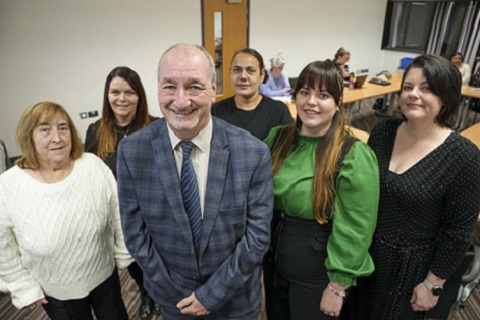A vision for a mentally healthier West Midlands in which residents thrive at school, college and work, and in their own communities is set out in the final report of the region’s second Mental Health Commission. The West Midlands Combined Authority (WMCA) convened the independent Commission last year to gather evidence into the impact of the pandemic on the mental health and wellbeing, and to draw up a set of collective actions that can be taken regionally with partners to respond to those wide and deep impacts.
In an immediate response to the findings and recommendations, the WMCA has made a series of new funding commitments including £900,000 to expand its hugely successful Thrive programme with a new strand, Thrive at College, which will offer support to 19 to 23-year-olds with mental health and wellbeing while they are at college. The Thrive programme has already supported 4,000 people with long-term health issues find and retain jobs, and 550 businesses commit to improving staff wellbeing.
The WMCA has also ringfenced £3 million from the Commonwealth Games Legacy Enhancement Fund’s Community Grant programme for community-led schemes that promote physical activity and wellbeing – both drivers of good mental health. A further £2 million will be used to help grow the region’s social economy – to support of the Commission’s recommendations around creating self-sustainable communities.
The Commission was made up of leaders of local government, health, social care, the voluntary and community sector, business, sports, and criminal justice, and people with experience of mental health difficulties. Members were supported by the Centre for Mental Health.
Its final report and 13 recommendations were published at an event in Birmingham hosted by Andy Street, Mayor of the West Midlands and WMCA chair, on Wednesday 28 June.
- The recommendations include:
- Tackling an increase in demand for children’s mental health service by promoting learning about mental health within the curriculum with more access to counselling and empowering parents to carry on that education at home.
- Community-specific support, particularly in racialised communities which experience much poorer mental health outcomes.
- Working to systematically reduce barriers that may prevent residents from taking part in physical activity -proven to be good for mental health - such as cost, lack of culturally appropriate options, access to and lack of active travel infrastructure.
- Promoting region-wide social value principles in public sector procurement of goods and services to put more money in the pockets of local people.
The Mayor said: “This report lays bare how the pandemic and cost-of-living pressures have exasperated mental health inequalities in the West Midlands, and why we must do what we can to tackle the issue head on.
“That’s why in response to this report we’re taking clear action by expanding our hugely successful Thrive programme – which has already supported 5,000 people with long-term health issues find and retain work - and by making money available for community-led initiatives through the Commonwealth Games Legacy Enhancement Fund.
“This action is on top of the work that our partners, some of whom sat on the Commission, are also doing to address mental health in the region. This includes community wellbeing programmes to support people understand and improve their own mental health, tackling poor and overcrowded housing, reducing loneliness and isolation, and bringing people together through community hubs, football and gardening sessions.
“Finally, I want to thank the commission for their work and make a promise that we will take a closer look at their recommendations to ensure the WMCA continues to address these issues through our skills, transport, environment, and housing programmes, and to pledge to continue to work with our partners across the region to maintain good mental health as a priority for everyone.”
Danielle Oum, chair of the West Midlands Health Commission and chair of the Coventry and Warwickshire Integrated Care Board (ICB), said: “This report is our vision for a mentally healthier West Midlands and our recommendations offer a way forward to achieving that.
“They won’t bring about change overnight but will set us on the path to having mentally healthier schools and colleges, thriving communities, and fairer services. That’s how we will improve people’s opportunities for a better life and create a more just and equitable society for all.”
Councillor Izzi Seccombe, the WMCA’s wellbeing portfolio lead and leader of Warwickshire County Council, said: “The West Midlands has been leading the way nationally in seeking to improve residents’ mental health through the really important work of the Mental Health Commission and the WMCA’s groundbreaking Thrive programme.
“Building on the success Thrive is already having and the new funding through the Commonwealth Games Legacy Enhancement Fund, we will use the findings and recommendations of the Commission to go even further. This is important because creating communities in which people are happy and healthy is key to our ultimate aim of a fairer, healthier and more inclusive region.”
The West Midlands Mental Health Commission’s full report is available at www.wmca.org.uk/what-we-do/wellbeing/west-midlands-mental-health-commission/ Find out more about the WMCA’s wellbeing programme of work, including Thrive, at www.wmca.org.uk/what-we-do/wellbeing/. Enquiries about the WMCA Commonwealth Games Legacy Enhancement Fund should be emailed to This email address is being protected from spambots. You need JavaScript enabled to view it..












